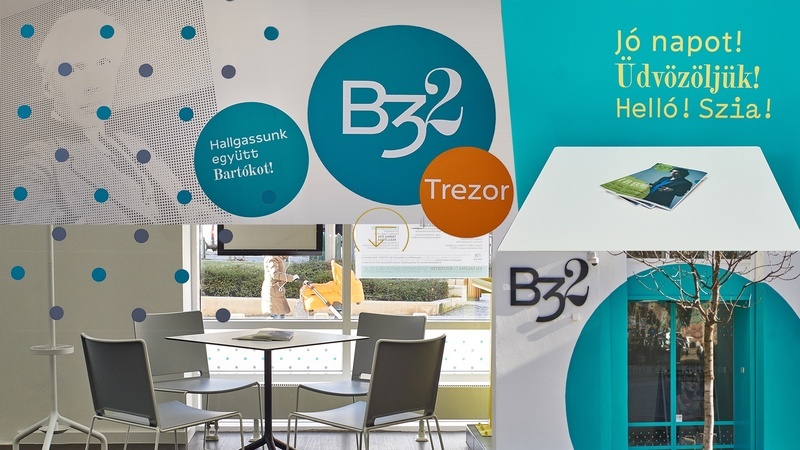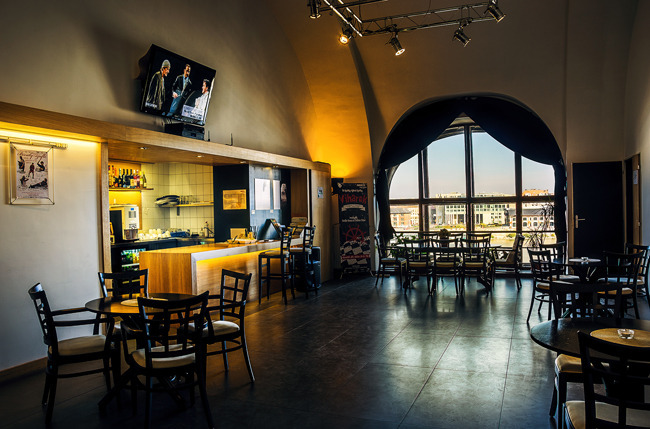Trafó House of Contemporary Arts - main venue/meeting point in the morning
1094 Budapest, Liliom u. 41.
Trafó House of Contemporary Arts in Budapest, a receptive venue unique to Hungary, is embedded in the international contemporary scene, where the various genres – theater, dance, new circus, music and other visual arts – are presented in an individual and authentic manner will be 20 years old in 2018.
The professional program of the institute, operating in a postindustrial space, is organized according to a unified, yet diverse approach, which is experimental and audience-friendly at the same time, based on new directions as well as our cultural memories and providing space for the presentation of both domestic and international artists.
Trafó is a mediating site dedicated to social issues, a platform for establishing values and contexts as well as generating new ideas and productions. Its performances, concerts, exhibitions, community and audience-building programs address a number of different generations, viewers of all kinds open to something new, whilst in its operation devoting special attention to the younger generations.
 |
Artus Studio
1116 Budapest, Sztregova u. 7.
The Artus Company is an independent contemporary physical theatre, established in 1985 by Gábor Goda. Since being founded, the company has created more than 60 performances and played in 25 countries. Right from the beginning, they have been actively involved in seeking and organizing international projects, residency programmes and co-productions.
Artus is not only an interdisciplinary collective, made up of the 30 artists working here, and the association that provides the infrastructural background for artistic work, but also a studio: a creative centre, with its own 2000-square-metre venue converted from an abandoned factory building. The studio regularly hosts performances by the Artus Company, as well as visual art exhibitions, guest performances and various other cultural events.
Atrium
1024 Budapeset, Margit krt. 55.
The renewed Atrium brings together different branches of the performing arts – theatre, film, dance and music – in order to create some truly unique productions. Their repertoire ranges from classical dramas, such as Chekhov’s The Seagull, to popular musicals like La Cage aux Folles. Certain shows are surtitled in English. Atrium has also hosted several productions by the Budapest Operetta and Musical Theatre and by Béla Pintér and Company. Atrium is committed to high quality entertainment that also reflects on our lives and on the pressing problems of modern-day society. The Pepita Café, open all day in the attractive art-deco foyer, serves a range of hot and cold drinks, sandwiches and cakes.
 |
B32
1111 Budapest, Bartók Béla út 32.
From the early nineties (under the name of Bartók 32 Gallery) this place was known as one of the cultic exhibitors of contemporary fine arts. It provided opportunities for many avant-garde astists to introduce themselves - the institute mainly served as a gallery at this time.
In 2014 the renowned place has expanded with a concert/theatre hall and a new exhibition room (called the Trezor Gallery). With these improvements B32 Gallery has quickly became the cultural and communal hub of Bartók Béla street.
Since the Autumn of 2015 the gallery tried to emphasize its openess and versatility through its programmes. The place - following the traditions of its predecessor - is available for progressive fine art exhibitions, as well as for contempory theatre projects, classical and popular music concerts. Regarding its selection of theatrical venues B32 tries to balance between the actual trends and the local demands.
 |
Bethlen Theater
1071 Budapest, Bethlen Gábor tér 3.
The theatre is located in the peripheral part of Budapest’s 7th District, on Bethlen Gábor Square. In 2012 it was renamed the Bethlen Theater – the same name it used to have before it was closed in 1937.
The change of name went hand in hand with a change of profile: before its reopening, the building had functioned as a dance theatre for more than 15 years; since then it has been a host and production theatre. Its objective is to breathe new life into the place by actively involving contemporary young artists and performers without imposing any restrictions on genre.
The programmes are organised in the spirit of “total art”. The four pillars –prose performances, dance, children’s puppet theatre and cabaret – have been extended with other genres, such as dance circus, visual theatre, improvisation and folk performances. Every month, visitors can enjoy festivals, contemporary dance and theatre performances, Sunday plays for children, free film screenings, and new exhibitions at the Bethlen Gallery. The café plays host to acoustic concerts, stand-up shows and improvised theatre performances.
 |
Budapest Contemporary Dance Academy
1036 Budapest, Perc u. 2.
The building was a textile paint and print factory from 1785. The studios were built in 1998 when Iván Angelus moved here his Creativ Movement Studio that worked since 1983 as a pioneering studio in contemporary dance in Hungary (and Central- and East-Europe).
Budapest Contemporary Dance Academy operates since 2005 as a state acknowledged higher education institution. At that time it was free for 15 students each year, but as the last 10 years the different governments stopped grants to all private institutions, actually every student must pay 1500 € per semester.
Today the school has 5 studios, study rooms, library, instrumental music practice rooms, other infrastructure on 1500 square meters.
More than the half of the creators and companies of the actual contemporary dance community comes from this school. Actually 29 BA and 7 MA students speak 15 languages.
INspiral Circus Centre
1117 Budapest, Sopron út 19/A
The INspiral Circus Centre is a community and practice space for independent Hungarian acrobats and jugglers. As a unique initiative in Hungary, the centre performs an important role, and its diverse activities are instrumental in reforming the role of circus in Hungary, by promoting the new circus as an artistic genre, by spreading the idea of circus as a leisure activity, and by introducing the social circus as a means of integration and therapy.
As a creative, educational and community space, as well as a base for our social circus projects, the centre is a place for both amateurs and professionals.
Covering an area of 310 square metres, the centre has three large halls, where we have been making our dreams come true since 1 April 2016. There is something for everyone: during the day there are rehearsals by circus companies, practice sessions for performers, as well as professional programmes and trainings; then, between 4 and 9 in the evening, we offer a wide range of classes teaching circus disciplines and other circus-related movement techniques and associated arts (trampolining, juggling, parkour, floor, partner or aerial acrobatics, etc.).
As part of our social circus projects we organize educational forums dealing with socially disadvantaged groups, and we provide training for experts working in the fields of therapy, social work and healthcare, where they can acquire knowledge of the social circus method.
Jurányi Production Community Incubator House
1027 Budapest, Jurányi u. 1.
In October 2017, the Jurányi Production Community Incubator House celebrates its fifth birthday: it was established with aim of creating a stable and public home in the 6700 m2 building of the former high school for the increasingly fragmented independent theatre and creative sector; of providing a rehearsal place, a creative studio, an office, a storage room, a gallery, a smaller and a bigger theatre hall for the artists. Besides the duties of a production and incubator house, there is also an emphasis on community building: with the establishment of Jurányi the goal was to create a cultural centre where the youth who interested in theatre and even the large families find their place and programs they like.
MU Theatre
1117 Budapest, Kőrösy József u. 17.
MU Theatre, a 130-seater black box presenting contemporary dance, theatre and music productions from both Hungary and abroad, was established in 1991. Based on a new artistic vision, MU Theatre extended its hosting function in April 2009, including the launch of a theatre teaching program, introductory public discussions on selected performances, and the management of own productions. In the compilation of the repertoire, emphasis has shifted from quantity to quality, thus giving more attention and energy to the hosted artists and creations.
In addition to the presentation of finished productions, MU also undertakes to organize and host workshops, seminars and platforms as well as festivals.
![]()

![]()
Müpa Budapest/National Dance Theatre
1095 Budapest, Komor Marcell u. 1.
The National Dance Theatre, as the most important centre of the Hungarian dance scene, works with nearly forty Hungarian professional companies as a host theatre.
After thirteen years, the National Dance Theatre left the building of the Carmelite Monastery in autumn 2014 and has been staging its repertoire in alternative venues. It organises one hundred days of dance performances as a resident institution in Müpa Budapest. In addition, performances are held at the MOM Cultural Centre, the Bethlen Square Theatre and the Royal Garden Pavilion's stage.
With the renovation of the Millenáris Theatre, the National Dance Theatre will receive its own new performance space in autumn 2018, a space worthy of the position of the Hungarian professional dance movement; thereby creating a modern, European quality, 21st century dance centre which conserves and represents traditional and contemporary dance alike.
 |
Szkéné Theatre
1111 Budapest, Műegyetem rkp. 3.
Szkéné Theatre has been working in its present home in the main building of Budapest Technical and Economics University since 1970, more than forty years. This chamber theatre has been the 'alma mater' of the alternative, independent movement in Hungary for decades. Well-known practitioners of almost every branch of artistic life have begun their careers here – theatrical ensembles such as Árpád Schilling or Béla Pintér, dancers, musicians, painters and sculptors and performers have had and still do have today the confidence and the opportunity to try out their talents at the start of their careers. At present the theatre is functioning as a receiving theatre, an open-minded alternative theatrical and artistic base, with no resident company.
 |
University of Fine Arts - Feszty-House
1063 Budapest, Kmety György u. 27.
Vártkert Bazár/National Dance Theatre
1013 Budapest, Ybl Miklós tér 4.
The National Dance Theatre, as the most important centre of the Hungarian dance scene, works with nearly forty Hungarian professional companies as a host theatre.
After thirteen years, the National Dance Theatre left the building of the Carmelite Monastery in autumn 2014 and has been staging its repertoire in alternative venues. It organises one hundred days of dance performances as a resident institution in Müpa Budapest. In addition, performances are held at the MOM Cultural Centre, the Bethlen Square Theatre and the Royal Garden Pavilion's stage.
With the renovation of the Millenáris Theatre, the National Dance Theatre will receive its own new performance space in autumn 2018, a space worthy of the position of the Hungarian professional dance movement; thereby creating a modern, European quality, 21st century dance centre which conserves and represents traditional and contemporary dance alike.
 |
Workshop Foundation
1027 Budapest, Jurányi u. 1 - 3. 4th floor
Workshop Foundation was founded in 1993. It focuses mainly on the following aspects: social and professional environment, partnership, collaboration, crossing borders among geographical and artistic disciplines as well as long-term thinking.
WSF runs 4 studios in two highly important, independent art institutes - in Trafó House of Contemporary Arts and in Jurányi Incubator House. The Foundation works with nearly 200 Hungarian and foreign artists yearly - principally - on the field of contemporary dance. Workshop Foundation is mostly known abroad for its international coproductions, training and residency programs as well as its active role in networks. Important networks, partnerships: Life Long Burning, Aerowaves, GPS - Movement Research, Philadelphia Dance Projects, PEJA.
 |